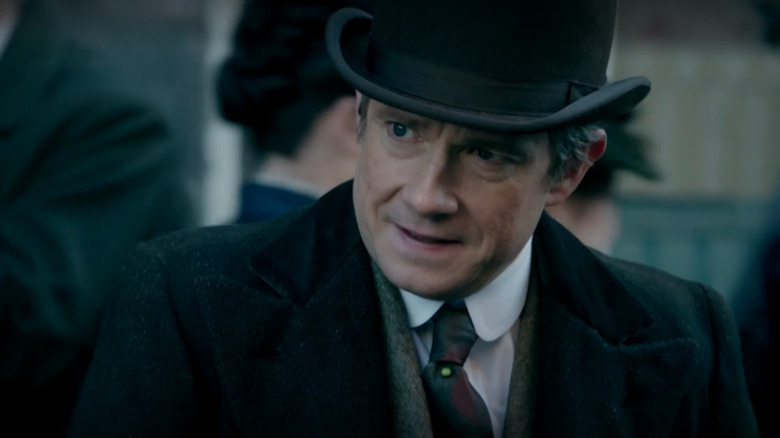Sherlock Holmes May Be A Renowned Detective, But His Real-Life Inspiration Was Not
Sherlock Holmes has been one of the most enduring literary characters in pop culture for over a century. Created by Sir Arthur Conan Doyle, the consulting detective is so prolific that he's been the inspiration behind BBC's "Sherlock," the medical drama "House," and two Guy Ritchie films. He even inspired the recent "Enola Holmes" movies on Netflix.
Still, many fans of the famed cold reader and deductive reasoning expert will likely be unaware of the character's real-life inspirations. Though Sherlock Holmes first appeared in Doyle's 1887 novella, "A Study in Scarlet," the detective was inspired by figures like Dr. Joseph Bell and Dr. Henry Littlejohn.
While best known as a surgeon, Bell was every bit as impressive as Sherlock Holmes when it came to demonstrating cold reading for his students. It's said that Bell could accurately reveal many personal details of someone's life, such as their occupation, history, and personal habits, simply by observing them for a moment. Meanwhile, Littlejohn was also a surgeon who could infer details from the most minute of clues and may have also helped to inspire Sherlock's sidekick and narrator, Dr. John Watson.
Sir Arthur Conan Doyle said Joseph Bell was the real-life Sherlock
Sir Arthur Conan Doyle himself had actually studied medicine under both Dr. Joseph Bell and Dr. Henry Littlejohn when he was attending Edinburgh University in the 1870s, though he only initially credited Bell as the inspiration for Sherlock Holmes. In fact, Doyle even wrote Bell a letter thanking him for helping to inspire the character.
"It is most certainly to you that I owe Sherlock Holmes, and though in the stories I have the advantage of being able to place him in all sorts of dramatic positions, I do not think that his analytical work is in the least an exaggeration of some effects which I have seen you produce in the outpatient ward," Doyle wrote.
Though Doyle didn't publicly acknowledge Littlejohn for many years to come, it's hard to imagine how he could be unaware of the real-life forensics expert, considering he had worked under him while attending his studies. Fortunately, Doyle did eventually point out Littlejohn as a source as well, mentioning him along with Bell much later in his life.
What makes this even more interesting, though, is that it was Littlejohn who actually worked as the consulting detective, with Bell often serving as his helper. So in this way, it could be argued that both men helped to inspire the two central characters at the heart of Sherlock Holmes — the detective himself and his faithful friend, Dr. John Watson.

